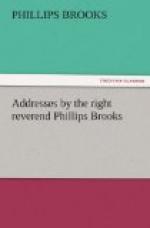Then there is another thing that people are always thinking, that I hear very often from men, and that I have no doubt that I should hear from many of you, one by one. You talk about your earlier religion as if it had been some sort of a bondage from which you had escaped. How common it is to hear men, especially in this region, say: “I would be, perhaps, religious, except that there was so much religion forced upon me in my earliest days. I was driven to church when I was a boy, in those old Puritan days. I went to school, where they forced prayers upon me all the time. I was made to be religious, so now I cannot be religious.” Was there ever a more dreadful thing than for a soul to say that, because, it may be, of the unwisdom, or the imprudence, the overzeal and the mistaken zeal of other men, we have not got the full blessing of that rich, open, free life with Christ which the youth may have, and therefore we will abandon the privileges of our higher life which is given to us in our manlier years? It all comes of this awful way of talking as if religion were the duty and not the inestimable privilege of human kind. The Christ stands before us and says, “Come to me.” You say, “Must I?” And He answers, “You may.” He will not even say, “You must.” You may. And duty loses itself in privilege, and the soul enters into independence and escapes from its sins, fulfils its life, lays hold of its salvation, becomes eternal, begins to live an eternal life in the accepted and loving service of Christ.
Now just one word, my friends. If this be so, whether you to-day are ready to make Christ your master and your friend or not, do not, I beg you, let yourself say that it is a silly or unreasonable belief, thus to know of a spiritual presence which is here among us, in which God is really in humanity. Do not let yourselves say, my friends, that the man who gives himself to Jesus Christ and earnestly tries to enter in deeper and deeper into his life and tries to do his will, that he may know the Christ and know himself in the Christ more and more—dare not call that brother a fool, as you have sometimes called your Christian man who watched scrupulously over his life and prayed, yes, prayed, the thing you think perhaps the foolishest thing that man can do, the thing that is the most reasonable act that any man does upon God’s earth. If man is man and God is God, to live without prayer is not merely an awful thing: it is an infinitely foolish thing. When a man for the first time bows down upon his knees and prays, “Oh! Christ, come unto me, reveal Thyself to me, make me to know Thee, that I may receive Thee, make me to be obedient that I may take Thee into my life,” then that man has claimed his manhood. I beg you, I implore you, I adjure you that, if you be not ready to be Christian, you at least will know that the Christian life is the only true human life, and that the man who becomes thoroughly a Christian sets his face toward the fulfilment of his humanity, and so for the first time truly is a man. “As many as received Him,”—so the great Scripture word runs of this Christ of whom we have been talking,—“As many as received Him, to them gave He power to become the sons of God.”




